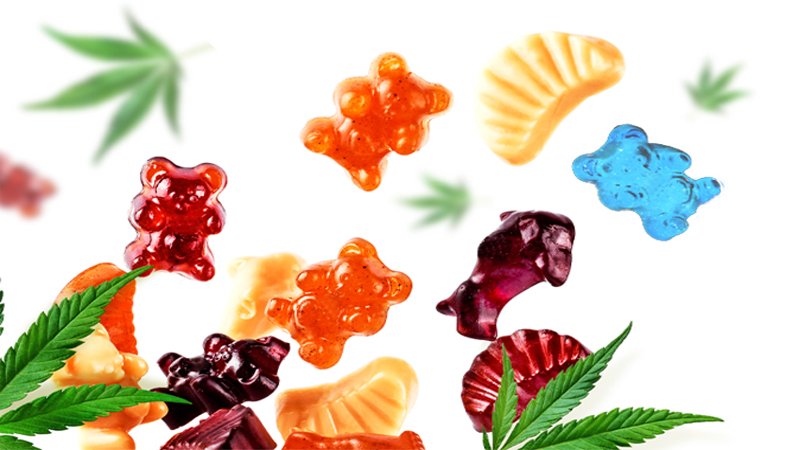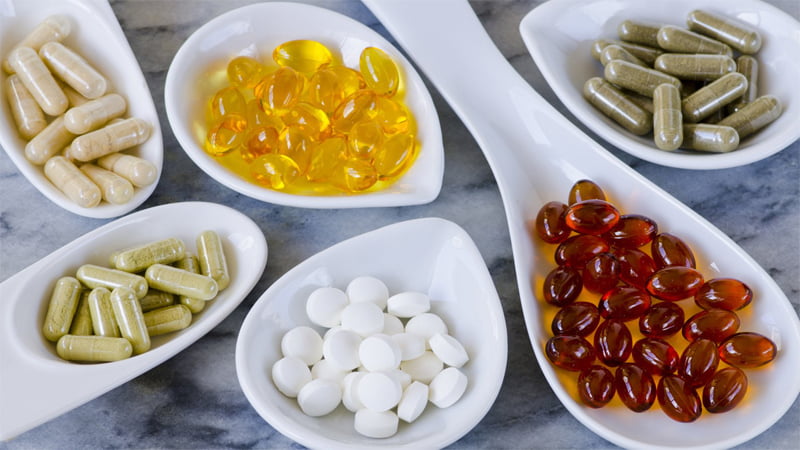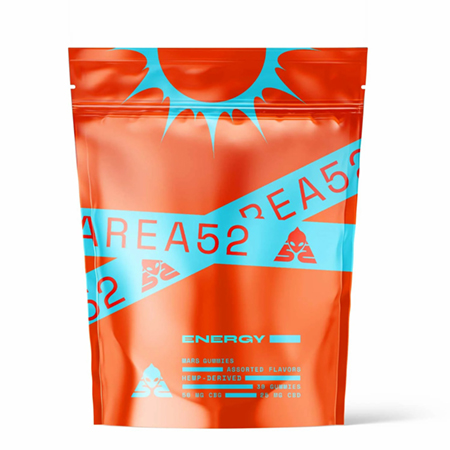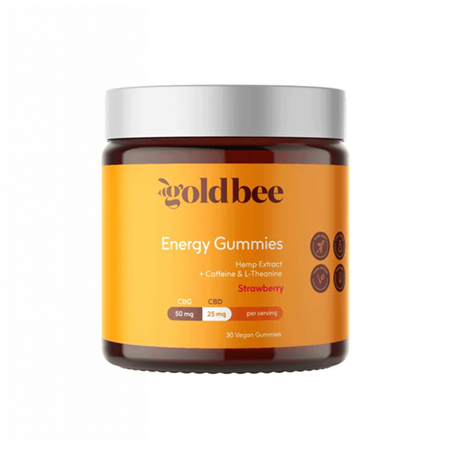Best CBG Gummies for Energy & Focus of 2023

CBG seems to be turning more heads every day. Derived from hemp, it’s the active version of CBGA, also known as “the mother of cannabinoids.”
Although still heavily regulated, cannabis products continue to trend — and people continue to follow.
Just like CBD, the CBG market is full of different brands offering you the best products for your health needs. That being said, not every brand can live to certain quality standards, especially when it comes to transparency.
Today, we dive into one of the most popular supplements for energy these days — CBG gummies.
Let’s take a look at the brands that specialize in hemp-derived edibles focused on CBG.
Best Gummies for Energy
1. Area 52
Get 15% off all Area 52 products. Use code “CFAH” at checkout.
| Type of Extract | Full Spectrum |
| CBG Potency | 50 mg |
| CBD Potency | 25 mg |
| Additional Ingredients | Green Tea Extract, L-Theanine, Vitamin B12 |
Area 52 is a Nevada-based brand specializing in full-spectrum products focused on different cannabinoids. The company started out making delta 8 THC products, and after succeeding with its first line as one of the best delta 8 THC vendors, it followed through with a collection of CBD and CBG extracts.
The Area 52 CBG gummies pack a potent dose of 50 mg of CBG supported by 25 mg of CBD and energy-stimulating terpenes, such as pinene, limonene, and beta-caryophyllene.
On top of that, they feature a green tea extract, vitamin B12, and L-theanine — all three ingredients are known for their ability to increase focus, energy, and support regeneration.
I usually take 1-2 gummies per day, just like Area 52 recommends on the bag. A funny thing is that I’m not high at all, but these cerebral effects paired with relaxation from CBD puts me in a somewhat euphoric mood. I can still be functional for the rest of the day though.
The gummies are made from organic hemp and extracted with CO2 to avoid adding extra heat or toxic solvents on the way. You can view the certificates of analysis on the Area 52 website.
2. Gold Bee
| Type of Extract | Full Spectrum |
| CBG Potency | 50 mg |
| CBD Potency | 25 mg |
| Additional Ingredients | Green Tea Extract, L-Theanine, Vitamin B12 |
Gold Bee is one of the best picks if you’re looking for all-organic CBD products from locally-grown hemp. The guys at Gold Bee not only make unique formulations containing exceptional levels of terpenes, but they also infuse their products with superfoods, such as organic honey and coconut oil.
The Gold Bee Energy Gummies contain the same ratio of CBG to CBN as the Area 52 gummies; they also feature similar supportive ingredients, such as green tea, vitamin B12, and L-Theanine.
So, what makes them different from the competitor? As I mentioned, Gold Bee uses its proprietary blend of terpene-rich strains to provide a stronger entourage effect — and they come in a strawberry flavor.
The best way to pick out the nuances is to try both products and see how you react to them.
Do CBG Gummies Improve Energy?
CBG has great potential to improve the quality of your life. In this section, we’ll take a look at the most noteworthy benefits CBG gummies may have for our energy levels.
CBG for Improved Focus
In one study, CBG showed neuroprotective properties; the authors theorized that CBG could even potentially treat neurodegenerative illnesses like Huntington’s disease.
Moreover, CBG may help in slowing down the degeneration of nerve cells in the brain and may even potentially bring some flawed brain functions back to normal.
People who struggle with poor focus and difficulty concentrating are often having memory lapses and could reap the benefits of using CBD gummies for energy and cognition.
For those seeking to enhance their productivity during the day, chewing a CBG gummy can be a viable option.
CBG for Stress Relief
Similar to CBD, CBG can be used to shed some stress off your shoulders. CBG acts as a GABA-reuptake inhibitor, increasing your levels of gamma-aminobutyric acid, or GABA, to induce feelings of relaxation and a calmer mood. GABA also controls your dopamine, also known as the feel-good hormone.
Research has shown that supplementation with CBG can reduce behavioral and endocrine sensitivity to chronic stress. However, it’s important to note that we need more clinical studies to prove these properties on large populations.
If you want to use CBD gummies for energy, talk to a doctor who’s experienced in using cannabis and other natural treatments.
CBG for Sharper Vision
CBG can lower intraocular pressure (IOP). High IOP tends to drain the fluid in your eyes which may cause them to lose their function; if neglected, elevated IOP can lead to glaucoma.
One of the best things about using CBG gummies is how they produce their effects. Since they’re edibles, the gummies need to be metabolized by the liver; from there, the CBG is gradually released into the bloodstream, allowing you to experience its benefits.
Due to that steady release, the effects of CBG last longer than other forms — up to 12 hours. They’re much more effective at relieving IOP than vapes or oils because you don’t need to reapply the dose to keep the pressure under control.
Many people who work from home forget that chronic exposure to artificial light wavelengths is deteriorative for the sight — translating into poor focus and energy.
This is where CBG gummies may help.
CBG vs. CBD: What’s Better for Energy?

Both CBG and CBD act on the same cannabinoid receptors, but the difference between CBD and CBG is that their effects may vary depending on several factors, such as time of day, dosage, additional ingredients, tolerance to both compounds, etc.
Using CBD for Energy
CBD doesn’t have a direct effect on your energy levels. Instead, it can make you feel less tired by balancing your endocannabinoid system and acting on several receptors that control mood, focus, and gives you energy.
For example, CBD modulates the activity of serotonin and GABA; it also boosts the natural production of anandamide and has been shown to improve the facial recognition skills of subjects in one study.
When you use lower doses of CBD in the morning, it can have a wake-promoting effect, especially when combined with the right blend of terpenes.
Higher doses taken in the evening may facilitate more regenerative sleep, contributing to higher energy levels in the morning.
Using CBG for Energy
According to studies and reports from the users, the effects of CBG are more direct because it also has some affinity with the CB1 receptor in the brain. When you take CBG, you may feel more energized, focused, and soothed — not to mention increased creativity.
Of course, these conclusions come from anecdotal reports and preliminary studies, but considering the interaction between other cannabinoids and the endocannabinoid system, it’s only within reason to assume that CBG may have similar benefits — but expressed in a slightly different manner.
Another benefit of eating CBG gummies for energy is their influence on your digestive system. CBG appears to soothe inflammation and improve gut motility. So, with reduced physical discomfort, you can achieve better mental clarity.
How Terpenes Work for Energy
Cannabinoids and terpenes demonstrate synergism that amplifies the health benefits of cannabis extracts. The same goes for using CBG gummies for energy.
Aside from providing plants and their derivatives with their distinct aromas and flavors, terpenes have a lot of therapeutic benefits on their own. They also add character to the effects of cannabis.
Without terpenes, smoking, vaping, or eating CBG and other cannabinoids would result in bland effects and lower potency.
The phenomenon described above is known as the entourage effect.
Let’s take a look at the terpenes that can be used in CBG gummies for a jolt of energy.
Terpenes to Look for in CBG Gummies for Energy
There are three terpenes that can elevate your energy levels. Look for them in the certificate of analysis (COA) of your CBG gummies:
- Alpha Pinene – it’s the most commonly found terpene in nature. Just take a walk in a forest and you’ll easily notice refreshing piney notes coming from the trees’ needles. Alpha pinene is known to improve memory and focus, as well as reduce short-term memory problems when you get too high on THC-rich cannabis. Other sources of pinene include rosemary, mint, fennel, and juniper.
- Limonene – as the name implies, you’ll find this terpene in the zest of citrus fruits, such as lemon, lime, oranges, and grapefruits. Limonene is known for its energy-boosting properties and anxiolytic (anti-anxiety) effects. When you take a product high in limonene, the terpene improves the absorption of other cannabinoids and terpenes.
- Beta-Caryophyllene – another widely used terpene with a distinct flavor and aroma, beta-caryophyllene is responsible for earthy notes and the spiciness of black pepper. You can also find it in basil, oregano, lavender, hops, and cinnamon. The compound interacts with CB2 receptors, enhancing the effects of other cannabinoids. Beta-Caryophyllene also has remarkable anti-inflammatory qualities.
What’s Inside the CBG Energy Gummies?

Energy gummies usually contain a blend of CBG and CBD because CBG alone is more difficult to obtain and thus more expensive.
The idea behind combining CBG with CBD is to achieve the proper ratio of both compounds so that you can get the most out of their energizing properties.
Energy gummies may also contain additional supportive ingredients, such as vitamin B12., L-theanine, caffeine, guarana, or a blend of focus-enhancing terpenes like pinene and limonene.
Last but not least, the active ingredients are contained in a high-carbohydrate gummy base, which can provide an energy boost for a short period of time before or after a workout.
Other Energy Supplements You Can Consider
While it’s true that CBG gummies are a versatile supplement for energy, there are other natural remedies out there you can use to fuel your motivation and enhance focus.
Here’s a list of my personal favorites:
Ashwagandha
Indian Ayurveda considers ashwagandha one of the most important medicinal herbs. The herb is thought to boost energy by enhancing your body’s reaction to physical and mental stressors.
In one study, people consuming ashwagandha reported significant improvements in several markers of stress and anxiety, compared to the placebo group. They also demonstrated 28% lower levels of cortisol — a hormone that gets elevated when you’re stressed.
These findings were further supported by a review of five studies examining the efficacy of ashwagandha in reducing stress and anxiety.
Iron
The body needs iron to produce hemoglobin, a protein in red blood cells that is responsible for the transportation of oxygen from the lungs to the organs and tissues throughout the body.
When you become deficient in iron your red blood cells can’t effectively carry that oxygen to the said tissues.
This leads to anemia, which may leave you feeling weak and drained from energy.
Common causes of anemia include blood loss, pregnancy, or an iron-poor diet. A supplement containing iron may be needed to level this deficiency and avoid the consequences of anemia.
Melatonin
Melatonin is also known as a sleep hormone. Its production in the body depends on the time of the day — increasing in the evening and decreasing in the morning.
Using melatonin-infused supplements may be an effective way to ease insomnia, a sleep disorder affecting approximately 30% of the global adult population.
Chronic insomnia may lead to constant tiredness and low energy levels. Its symptoms include difficulty falling or staying asleep, waking up too early, and insufficient time spend in the deep sleep stage.
If you’re using CBG gummies for energy, you may consider adding CBD-infused gummies with melatonin to your evening routine to take better care of your sleep cycles.
Creatine
Creatine can be easily sourced from food, such as beef, pork, poultry, and fish. It makes for a source of quick energy for the body.
Adenosine triphosphate (ATP) is your physical currency for energy exchange. When your body uses ATP to produce energy, it loses a phosphate group – turning it into adenosine diphosphate.
So, when your body needs a quick energy boost, creatine comes with its phosphate to ADP and becomes ATP.
This provides you with the energy needed for intense, short-duration workouts, such as short sprints, weight lifting, or jumping.
According to a review of 53 studies, creatine supplements improve bench press records by 5%. This means that someone who could bench 200 pounds before supplementation could press 10 pounds more just from taking creatine.
Beetroot Powder
Beetroot powder is made from dried beetroot and offers high concentrations of nitrate.
Nitrate produces nitric oxide in the body, leading to the relaxation of blood vessels and increased blood flow and oxygen delivery.
Thanks to that, your body can be more efficient in producing energy, particularly when it comes to exercise.
Several study analyses highlighted beetroot powder supplementation as a way to increase endurance in athletes during exercise. In some cases, beetroot supplements allowed people to increase their exercise time by 25% compared to taking a placebo.
Caffeine with L-Theanine
Caffeine is well-known for its ability to boost energy in the form of coffee, tea, sodas, cocoa beverages, and energy drinks.
However, many people choose to avoid caffeine or, at least, reduce its amount because it causes them to become irritated, nervous, and restless — resulting in a crash after its initial energy kick.
But adding L-theanine to the mix can be an easy way to prevent these adverse reactions.
L-theanine is an amino acid naturally found in some mushrooms and tea. It can promote relaxation without triggering drowsiness.
Several studies have shown that the combination of caffeine and L-theanine has been shown to improve reaction time and memory; it also decreased mental fatigue and overall tiredness.
Vitamins for Energy: Which Should You Use?

Adding vitamins to your supplementation plan is another smart way to increase the efficacy of your CBG gummies for energy.
These vitamins will help you stay active and focused during the day without feeling fatigued as the evening draws near.
Vitamin A
New research shows that vitamin A plays an important role in energy metabolism and skin aging reversal. It allows cells to generate all energy required by the human body daily. Vitamin A deficiencies can trigger various physical and psychological symptoms. They impact the immune system and proper vision, leading to energy-sapping conditions such as interrupted sleep function and increased lethargy.
Vitamin B
Here we need to take a look at the whole “B” group of vitamins:
- Vitamin B6: your body needs it to produce serotonin and dopamine, which are stress-relieving and mood-regulating neurotransmitters. Balanced levels of dopamine and serotonin result in more mental clarity, a stronger immune system, and proper communication between the cells of the nervous system.
- Vitamin B2: It can effectively boost your energy levels by facilitating the breakdown of carbohydrates into fuel. It can be sourced from mushrooms, almonds, and wild rice.
- Vitamin B12: it’s one of the most essential vitamins and directly aids the transformation of the food you consume into energy particles that your cells can effectively use. Vitamin B12 is also paramount for maintaining the health of your blood and nerve cells. You’ll find it mostly in animal proteins, such as meat, fish, and dairy products. Supplementation with vitamin B12 can increase your energy and stamina, especially when you combine them with CBG gummies.
- Vitamin B9: also known as folic acid, this vitamin can help boost energy levels; adults who are deficient in vitamin B9 can develop anemia, resulting in feelings of lethargy and weakness. Avocado, spinach, and beans are good sources of folic acid.
- Vitamin B5: some evidence points to vitamin B5 as one of the key components in the body’s stress-management and energy-producing pathways. Not including this vitamin in your diet or supplementation plan may result in generalized fatigue and poor stress response.
- Vitamin B3 (Niacin): this vitamin has gained popularity among doctors for the treatment of high cholesterol. It can also improve metabolism and stimulate blood flow, potentially improving sexual health and keeping you energized throughout the day. Mushrooms and avocados contain large doses of vitamin B3.
Vitamin C
Although most people associate vitamin C with the immune system, it’s one of the best vitamins to improve your energy levels. Vitamin C is a potent antioxidant and anti-inflammatory — just like the CBG from your gummies. Therefore, it can assist you in combating bacteria, viruses, and fatigue.
Vitamin D
Vitamin D deficiency is one of the most common health problems of the global population. It has been linked to feelings of fatigue, emotional unwellness, and mental instability, which can be tiring in the long run and lead to chronically low energy levels. Exposure to sunlight and supplementation with natural vitamin D can increase your energy. Similar to CBG, it’s a fat-soluble compound, so you can take it alongside your CBG gummies.
Vitamin E
Vitamin E is a potent antioxidant. According to studies, Vitamin E deficiency can impair muscle contractile function, which makes it easier for us to experience muscular fatigue during a workout. If you want to couple your vitamin E with CBG gummies for energy, take the vitamin after exercise to increase post-workout energy levels. The gummies, on the other hand, may serve you as a pre-workout.
Coenzyme Q-10
Coenzyme Q-10 is a natural antioxidant produced by the body to maintain a healthy energy production cycle, which is necessary to keep all our tissues and organs in good shape. Because immune cells call for a lot of energy, using CoQ10 can boost your immunity and reduce tiredness. Not only have low levels of this vitamin been linked to fatigue, but they also speed up aging processes and neurodegeneration.
Final Thoughts on the Best CBG Gummies for Energy
CBG, unlike CBD, has a more direct effect on our energy levels. It interacts with CB1 and CB2 receptors, which provides it with anti-inflammatory, stress-relieving, and analgesic properties.
On top of that, CBG can protect neurons from degeneration, delaying the onset of neurodegenerative diseases that cause energy loss, such as Alzheimer’s, Parkinson’s Disease, or Multiple Sclerosis.
If you’re looking for the best CBG gummies from reputable brands, make sure to check out Area 52 and Royal CBD. Both companies specialize in real full-spectrum products from organic hemp, so you can rest assured you’re getting safe and lab-tested gummies that work.
Feeling tempted by other avenues to increase focus and energy naturally? Try adding some of the supplements and vitamins from our article to your routine; but before you do so, consult your doctor and run general blood tests to determine specific deficiencies.
Have you tried eating CBG gummies for energy? Share your thoughts, I’m curious about your experience.
Sources:
- Nachnani, R., Raup-Konsavage, W. M., & Vrana, K. E. (2021). The Pharmacological Case for Cannabigerol. The Journal of pharmacology and experimental therapeutics, 376(2), 204–212. https://doi.org/10.1124/jpet.120.000340
- Gabriela Ferreira de Medeiros. Impact of CBG deficiency on emotional and cognitive processes. Neurons and Cognition [q-bio.NC]. Université de Bordeaux, 2016. English. NNT: 2016BORD0072.
- Tomida, I., Pertwee, R. G., & Azuara-Blanco, A. (2004). Cannabinoids and glaucoma. The British journal of ophthalmology, 88(5), 708–713. https://doi.org/10.1136/bjo.2003.032250
- Bakas, T., van Nieuwenhuijzen, P. S., Devenish, S. O., McGregor, I. S., Arnold, J. C., & Chebib, M. (2017). The direct actions of cannabidiol and 2-arachidonoyl glycerol at GABAAreceptors. Pharmacological research, 119, 358–370. https://doi.org/10.1016/j.phrs.2017.02.022
- Sales, A. J., Crestani, C. C., Guimarães, F. S., & Joca, S. (2018). Antidepressant-like effect induced by Cannabidiol is dependent on brain serotonin levels. Progress in neuro-psychopharmacology & biological psychiatry, 86, 255–261. https://doi.org/10.1016/j.pnpbp.2018.06.002
- Navarro, G., Varani, K., Reyes-Resina, I., Sánchez de Medina, V., Rivas-Santisteban, R., Sánchez-Carnerero Callado, C., Vincenzi, F., Casano, S., Ferreiro-Vera, C., Canela, E. I., Borea, P. A., Nadal, X., & Franco, R. (2018). Cannabigerol Action at Cannabinoid CB1 and CB2 Receptors and at CB1-CB2Heteroreceptor Complexes. Frontiers in pharmacology, 9, 632. https://doi.org/10.3389/fphar.2018.00632
- Gyires, K., & Zádori, Z. S. (2016). Role of Cannabinoids in Gastrointestinal Mucosal Defense and Inflammation. Current Neuropharmacology, 14(8), 935–951. https://doi.org/10.2174/1570159×14666160303110150
- Salehi, B., Upadhyay, S., Erdogan Orhan, I., Kumar Jugran, A., L D Jayaweera, S., A Dias, D., Sharopov, F., Taheri, Y., Martins, N., Baghalpour, N., Cho, W. C., & Sharifi-Rad, J. (2019). Therapeutic Potential of α- and β-Pinene: A Miracle Gift of Nature. Biomolecules, 9(11), 738. https://doi.org/10.3390/biom9110738
- Vieira, A. J., Beserra, F. P., Souza, M. C., Totti, B. M., & Rozza, A. L. (2018). Limonene: Aroma of innovation in health and disease. Chemico-biological interactions, 283, 97–106. https://doi.org/10.1016/j.cbi.2018.02.007
- Klauke, A. L., Racz, I., Pradier, B., Markert, A., Zimmer, A. M., Gertsch, J., & Zimmer, A. (2014). The cannabinoid CB₂ receptor-selective phytocannabinoid beta-caryophyllene exerts analgesic effects in mouse models of inflammatory and neuropathic pain. European neuropsychopharmacology: the journal of the European College of Neuropsychopharmacology, 24(4), 608–620. https://doi.org/10.1016/j.euroneuro.2013.10.008
- Mishra, L. C., Singh, B. B., & Dagenais, S. (2000). Scientific basis for the therapeutic use of Withania somnifera (ashwagandha): a review. Alternative medicine review: a journal of clinical therapeutic, 5(4), 334–346.
- Chandrasekhar, K., Kapoor, J., & Anishetty, S. (2012). A prospective, randomized double-blind, placebo-controlled study of safety and efficacy of a high-concentration full-spectrum extract of ashwagandha root in reducing stress and anxiety in adults. Indian journal of psychological medicine, 34(3), 255–262. https://doi.org/10.4103/0253-7176.106022
- Pratte, M. A., Nanavati, K. B., Young, V., & Morley, C. P. (2014). An alternative treatment for anxiety: a systematic review of human trial results reported for the Ayurvedic herb ashwagandha (Withania somnifera). Journal of alternative and complementary medicine (New York, N.Y.), 20(12), 901–908. https://doi.org/10.1089/acm.2014.0177
- Johnson-Wimbley, T. D., & Graham, D. Y. (2011). Diagnosis and management of iron deficiency anemia in the 21st century. Therapeutic advances in gastroenterology, 4(3), 177–184. https://doi.org/10.1177/1756283X11398736
- van Heukelom, R. O., Prins, J. B., Smits, M. G., & Bleijenberg, G. (2006). Influence of melatonin on fatigue severity in patients with chronic fatigue syndrome and late melatonin secretion. European journal of neurology, 13(1), 55–60. https://doi.org/10.1111/j.1468-1331.2006.01132.x
- van Geijlswijk, I. M., van der Heijden, K. B., Egberts, A. C., Korzilius, H. P., & Smits, M. G. (2010). Dose finding of melatonin for chronic idiopathic childhood sleep onset insomnia: an RCT. Psychopharmacology, 212(3), 379–391. https://doi.org/10.1007/s00213-010-1962-0
- van Geijlswijk, I. M., Korzilius, H. P., & Smits, M. G. (2010). The use of exogenous melatonin in delayed sleep phase disorder: a meta-analysis. Sleep, 33(12), 1605–1614. https://doi.org/10.1093/sleep/33.12.1605
- Lanhers, C., Pereira, B., Naughton, G. et al. Creatine Supplementation and Upper Limb Strength Performance: A Systematic Review and Meta-Analysis. Sports Med 47, 163–173 (2017). https://doi.org/10.1007/s40279-016-0571-4
- Hoon, M. W., Johnson, N. A., Chapman, P. G., & Burke, L. M. (2013). The effect of nitrate supplementation on exercise performance in healthy individuals: a systematic review and meta-analysis. International journal of sport nutrition and exercise metabolism, 23(5), 522–532. https://doi.org/10.1123/ijsnem.23.5.522
- McMahon, N. F., Leveritt, M. D., & Pavey, T. G. (2017). The Effect of Dietary Nitrate Supplementation on Endurance Exercise Performance in Healthy Adults: A Systematic Review and Meta-Analysis. Sports medicine (Auckland, N.Z.), 47(4), 735–756. https://doi.org/10.1007/s40279-016-0617-7
- Williams, T. D., Martin, M. P., Mintz, J. A., Rogers, R. R., & Ballmann, C. G. (2020). Effect of Acute Beetroot Juice Supplementation on Bench Press Power, Velocity, and Repetition Volume. Journal of strength and conditioning research, 34(4), 924–928. https://doi.org/10.1519/JSC.0000000000003509
- Temple, J. L., Bernard, C., Lipshultz, S. E., Czachor, J. D., Westphal, J. A., & Mestre, M. A. (2017). The Safety of Ingested Caffeine: A Comprehensive Review. Frontiers in psychiatry, 8, 80. https://doi.org/10.3389/fpsyt.2017.00080
- Haskell, C. F., Kennedy, D. O., Milne, A. L., Wesnes, K. A., & Scholey, A. B. (2008). The effects of L-theanine, caffeine and their combination on cognition and mood. Biological psychology, 77(2), 113–122. https://doi.org/10.1016/j.biopsycho.2007.09.008
- Haskell, C. F., Kennedy, D. O., Milne, A. L., Wesnes, K. A., & Scholey, A. B. (2008). The effects of L-theanine, caffeine and their combination on cognition and mood. Biological psychology, 77(2), 113–122. https://doi.org/10.1016/j.biopsycho.2007.09.008
- Camfield, D. A., Stough, C., Farrimond, J., & Scholey, A. B. (2014). Acute effects of tea constituents L-theanine, caffeine, and epigallocatechin gallate on cognitive function and mood: a systematic review and meta-analysis. Nutrition reviews, 72(8), 507–522. https://doi.org/10.1111/nure.12120
- Tardy, A. L., Pouteau, E., Marquez, D., Yilmaz, C., & Scholey, A. (2020). Vitamins and Minerals for Energy, Fatigue and Cognition: A Narrative Review of the Biochemical and Clinical Evidence. Nutrients, 12(1), 228. https://doi.org/10.3390/nu12010228 [1]
- Spinneker, A., Sola, R., Lemmen, V., Castillo, M. J., Pietrzik, K., & González-Gross, M. (2007). Vitamin B6 status, deficiency and its consequences–an overview. Nutricion hospitalaria, 22(1), 7–24.
- Mahabadi N, Bhusal A, Banks SW. Riboflavin Deficiency. [Updated 2021 Jul 21]. In: StatPearls [Internet]. Treasure Island (FL): StatPearls Publishing; 2022 Jan-. Available from: https://www.ncbi.nlm.nih.gov/books/NBK470460/ [2]
- Langan, R. C., & Goodbred, A. J. (2017). Vitamin B12 Deficiency: Recognition and Management. American family physician, 96(6), 384–389.
- Zsigrai, S., Kalmár, A., Valcz, G., Szigeti, K. A., Barták, B. K., Nagy, Z. B., Igaz, P., Tulassay, Z., & Molnár, B. (2019). A B9-vitamin élettani és kórélettani jelentősége. Összegzés a folsav táplálékkiegészítőként történő alkalmazásának 30. évfordulójára [Physiological and pathophysiological significance of vitamin B9. Summary on the occasion of the 30-year introduction of folic acid as a dietary supplement]. Orvosi hetilap, 160(28), 1087–1096. https://doi.org/10.1556/650.2019.31441 [3]
- Kelly G. S. (1999). Nutritional and botanical interventions to assist with the adaptation to stress. Alternative medicine review: a journal of clinical therapeutic, 4(4), 249–265.
- Ganji, S. H., Kamanna, V. S., & Kashyap, M. L. (2003). Niacin and cholesterol: role in cardiovascular disease (review). The Journal of nutritional biochemistry, 14(6), 298–305. https://doi.org/10.1016/s0955-2863(02)00284-x
- Chambial, S., Dwivedi, S., Shukla, K. K., John, P. J., & Sharma, P. (2013). Vitamin C in disease prevention and cure: an overview. Indian journal of clinical biochemistry: IJCB, 28(4), 314–328. https://doi.org/10.1007/s12291-013-0375-3
- Sizar, O., Khare, S., Goyal, A., Bansal, P., & Givler, A. (2021). Vitamin D Deficiency. In StatPearls. StatPearls Publishing. [4]
- Clarke, M. W., Burnett, J. R., & Croft, K. D. (2008). Vitamin E in human health and disease. Critical reviews in clinical laboratory sciences, 45(5), 417–450. https://doi.org/10.1080/10408360802118625
- Di Lorenzo, A., Iannuzzo, G., Parlato, A., Cuomo, G., Testa, C., Coppola, M., D’Ambrosio, G., Oliviero, D. A., Sarullo, S., Vitale, G., Nugara, C., Sarullo, F. M., & Giallauria, F. (2020). Clinical Evidence for Q10 Coenzyme Supplementation in Heart Failure: From Energetics to Functional Improvement. Journal of clinical medicine, 9(5), 1266. https://doi.org/10.3390/jcm9051266 [5]

